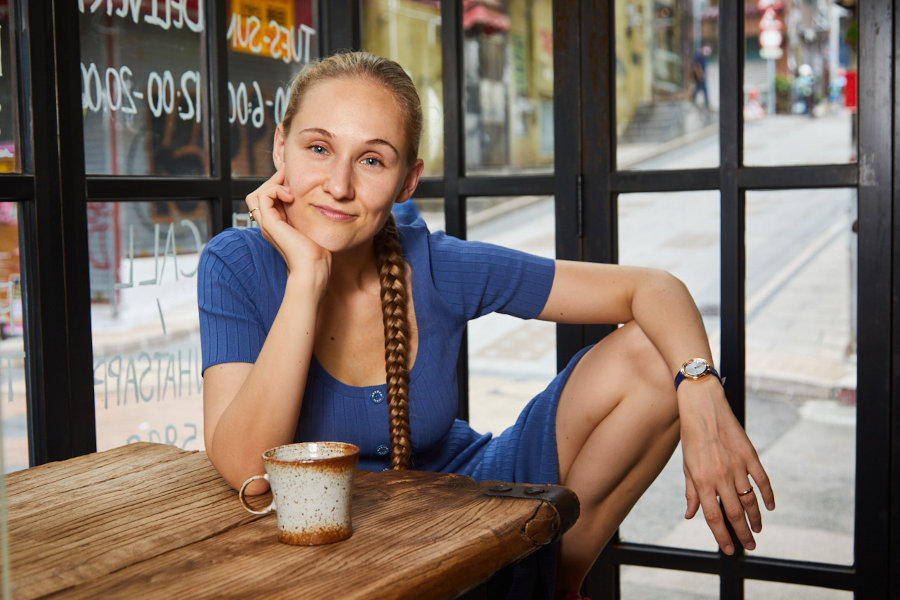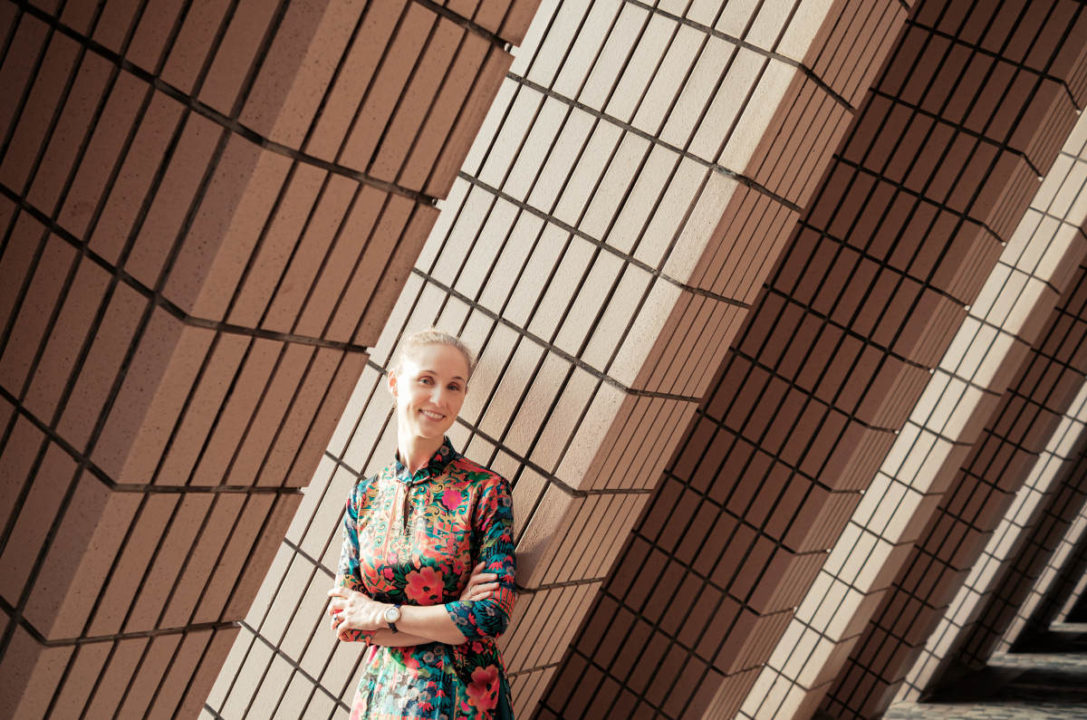Ashley Dudarenok is recognized globally as an expert on business trends and digital marketing in China. The founder and thought leader has also been named among the world’s top 100 retail influencers by RETHINK Retail. As a multicultural individual having been born in the Soviet Union, studying in Chongqing, China, and recently naturalizing as a Chinese citizen, The HK HUB chats with Ashley about the International Women’s Day 2023 theme, #EmbraceEquity, the state of gender equality and equity in mainland China and Hong Kong, how she was raised to have a barrier-breaking blindspot for gender biases, and the values she practices while navigating the business world.
#1 – Who is Ashley Dudarenok?
There are probably three things that describe me best. First of all, even though I’m blonde, I’m a Chinese entrepreneur. About 13 years ago, I started my first business which has grown into a couple of brands that all have links to mainland China. One such business is Alarice, a digital marketing agency focused on China. The other one is ChoZan, a consulting company that essentially helps tech companies and big firms learn to be more successful in China. So it’s to China and from China, building bridges between China and the rest of the world.
Secondly, I wear the author hat. My team and I have produced 10 books in the past five years or so. I believe that as a B2B business in a niche industry, it is very, very important to create this kind of knowledge base and share it. We are trying to raise the industry standards to educate our customers.
As a girl growing up, I always thought that girls could do anything and everything.
And the last big hat I wear is as a thought leader in our very particular industry. I do daily LinkedIn digests about happenings in mainland China in the digital space. There’s been a lot of buzz about China, digitalization, and marketing, and especially how the future of retail is built in China.

I was born in Soviet Russia, very close to mainland China. My hometown literally borders on Japan, China, and Korea. In the Soviet Union, women were rather equal to men, so we didn’t have a lot of prejudices. As a girl growing up, I always thought that girls could do anything and everything. Later on, when I was 17 years old, I moved to a city in mainland China called Chongqing and studied university there.
Back then, about 70% of small enterprises in mainland China were run by women. Factories and bigger enterprises were mostly organized by men, but when it came to the whole grassroot economy, it was all women. I basically learned that not only do women not have limitations on what they could become, but also saw how entrepreneurship is done in China – and women were driving the whole force.
In 2010, I relocated to Hong Kong. After working in a corporate job for a while, I went out in the unknown and started my own company. The first few years were very difficult. But right now we are where we are, with tons of China watchers in the industry, a few businesses, and teams not only in Hong Kong, but also in Shanghai and Shenzhen.
#2 – The IWD theme this year is #EmbraceEquity. How do you understand the difference between ‘equality’ and ‘equity’?
Equality is essentially that everybody needs to have the same access to school, the same apple, the same ice cream. I’m sure you’ve seen that illustration of three kids with different heights looking over a fence. They all have the same box, but one kid cannot see, while another kid doesn’t need a box to see over the fence. So this is equality, right? Giving everybody the same opportunities, the same access.
But equity is really about understanding that everybody has a different starting point, unique circumstances. Some women have kids, some women bear expectations that they’re going to be the primary caretaker of their parents. Let’s say there are three kids in a family, but one of the kids is a girl, who is often expected to look after her parents when they’re older; it doesn’t matter that she’s got a career and her own family. And we see that again and again, not only in Hong Kong and mainland China, but across Asia.

Everybody has those different starting points, and we need to be mindful of that and provide real opportunities for women to shine given the circumstances. That is extremely complex, because a lot of people don’t want to think so far or do not have the capacity to think so far. Organizations, big or small, have their systems.
It’s very difficult to implement, but it is not impossible. We are trying to take the first step of giving everybody the same access. But step number two on top of that foundation is building a system that recognizes everybody’s individual case and catering to them to support them. It’s a little bit like tailor-making a product for each consumer. And that’s not only for women, it’s for the LGBT community, it’s for men, it’s for elderly. There’s a lot of ageism as well.
But of course, running such an organization, running such an economy, running such a company requires a lot of complexity. And with tools like AI, with the fact that we are working more and more in a blended virtual-slash-offline world, we’ll arrive there. Today is just a starting point.
#3 – You’ve spent nearly two decades in mainland China and Hong Kong. How do you view the state of gender equity in Hong Kong/Chinese society?
I think mainland China and Hong Kong are two very different markets when it comes to gender equality. In my subjective experience, when I came to Hong Kong 13 years ago, mainland China was ahead. In mainland, probably because of communism as the general backdrop, these gender roles were less important or imposed in the professional world. If a woman decided to enter the professional world, in my experience, there was just more general acceptance.
In Hong Kong, there were still a lot of women going into the professional world, but it was for different reasons. Very often, it was for economic reasons. They could hire a nanny to look after their family, and if two people were working in the household, then they were going to make more money.
So it wasn’t the empowerment angle, it was more about the Hong Kong economy doing really well in the 70s to 2000s. If parents could make more money, they could hire more help, provide better education for their kids, et cetera.
There are still conflicting expectations [placed on women]… it’s far from perfect.
Mainland China is such a big country, so it’s very difficult to generalize. But in my very subjective experience in cities such as Shanghai and Beijing, a lot of women didn’t just want to make money. Even if they came from families that could support them until marriage, they wanted to work because they wanted to contribute beyond just the family. Some of these communism ideas empowered women to be more active in the professional world.
But even today there’s a difference, so we cannot generalize. In mainland China, there are a lot of problems with both equity and equality. Basically, there are two big views on women from the male perspective: one is that when you become a professional woman, then you are sort of equal to men. It’s not equity, but equality, right? You’re given generally similar opportunities. If you’re a woman in the professional world, you have a little bit of a shield. But if you are not in the professional world, there are still a lot of challenges.
In some of mainland China’s biggest gaming companies, they have women cheerleaders that come dressed in shorts and they basically dance to keep [the employee’s] spirits up, so women are also used with this entertainment angle.

And of course, if you are not married by the age of 30, you are called ‘leftover’. In general, there’s a lot more pressure on women when it comes to family planning in mainland China.
But this being said, mainland China is also progressing. For example, role models are becoming more diverse: women are featured in TV as more than just mothers or professionals. There’s a list of self-made female billionaires, two-thirds of whom are from China.
There’s a spotlight on women tech developers right now. There are a lot of support groups, like the women taxi drivers’ association in mainland China where women stand together and say, there are a hundred thousand other women like me and we have the power to help each other. And it’s not just women helping women, but there are also some male allies.
Secondly, especially since the start of the Me Too movement (which was not actively supported and very often even blocked and downplayed on major social platforms), Chinese netizens are also speaking out more and more for female empowerment. For instance, Chinese brands like the underwear brand Neiwai, for example, are featuring women of different shapes and skin shades, not just pale and skinny and whatever else. Whatever the brand or the company, it is quite common in mainland China that whenever somebody messes up with unfair treatment or biased campaigns, netizens give it volume and it becomes a big deal.
Female voices are also driving a lot of change in business. We are all talking about the sheconomy. Women around the world spend more than men. In mainland China, even on male-dominated social media platforms, gaming, or in literally every single aspect of life, women are driving consumption. So right now, it doesn’t matter what business I’m in – B2B, B2C, tech, non-tech – there’s more and more focus on this: if my consumers are women, how do I really understand them? How do I create with them, for them?
The Chinese market is a fast market. It’s all about China speed because it’s very reactive. That drives a lot of change with women essentially being the driving force. But as mentioned, there are still conflicting expectations. The expectations that women place upon themselves, the expectations that society and family place on them, are conflicting. It’s far from perfect.
And very often, the focus is on equality. Nothing else beyond just, “Here is an opportunity,” and nothing else is taken into account. But I would honestly say that’s also true for a majority of the world, not just China. It’s primarily about equality and not yet enough equity.
#4 – Women entrepreneurs face challenges that men don’t (for example, accessing funding, microaggressions). Have you experienced challenges as a female entrepreneur?
In my particular case, I don’t feel I ever faced them because I probably wasn’t looking for them. It’s selective blindness, I’m quite sure. I’m also the product of my culture. There are a lot of difficult things that the Soviet Union obviously stood for, but one thing that was good about communism and the Soviet Union execution of it was that there was this true sense of equality.
I never questioned whether or not I could do something just because I’m a girl. My mom and her sisters always worked. Since childhood, I was never taught at home or in the school or work systems that I shall feel inferior, or that if there are some barriers, it’s because I’m a woman. In my world growing up, that was not the case.


Were there challenges that I faced in the professional world and in my entrepreneurship journey? Absolutely. But were they gender-biased? Back then, I didn’t think so, and I still choose not to think so. A couple of professional friends have told me that when we don’t know that we are supposed to have a challenge, and we just act as if we don’t have it, we are also attracting a certain behavior around us. It might be a combination of selective blindness and the fact that just with the way I acted in the world, I left very few opportunities to discriminate or give me unequal access. I have a couple of friends from the Eastern Bloc coming from former Soviet republics and some friends from mainland China who are also in the entrepreneurship space, who have echoed this.
Now if I really need to recount, were there some incidents that I could interpret like this? Yes. But at the same time, when I speak with women entrepreneurs that come from more western backgrounds like the US and Europe, they definitely are a lot more aware. They can recall, they can recount, they can see, they can feel it. And they can recall how as children they were conditioned to think that way.
Working with western companies who have primarily male founders and male boards, I would say that right now it’s quite okay. I’ve also heard stories about accessing funding where people just don’t want to get mashed up with a female founder. A good friend of mine is married to a wealthy fellow entrepreneur. And some say, why does she even work? Like, what is it in for you? It still happens, but compared to probably five or 10 years ago, it’s getting better because people are becoming more aware.
#5 – From your perspective, what are the things that can be done in Hong Kong to work towards gender equity?
This is a huge question. Ultimately, there are a few agents of change. In the mainland China model, the first agent of change is the government, not consumers. The people think and talk about it, the government takes notice, and then it introduces the big picture. Through this big picture, large organizations start moving, then smaller organizations, and then it goes back to consumers.
In the Hong Kong model, my impression is that things are more distributed, less centralized. A lot of change is driven by the corporates. Hong Kong is a very corporate place, so they guide the standard. And there are a lot of standards! There’s a salary standard, there’s standard operating procedure standard. It’s usually the case that the corporate world sets it, and then everybody else tries to either plus one or minus two.
Making sure that there is a corporate standard on how they want to operate within their organization is a good starting point. The challenge is that often, these solutions are not really tailored to Hong Kong. They’re very big, very bulky, and kind of global. They’re often driven from the US which faces very different challenges as a different culture. I would say only 30% of the solutions ever find meaningful implementation in the actual workforce in Hong Kong. But nonetheless, it all starts with corporates.

Then from corporates, there is a broader kind of government guideline, typically. The Hong Kong government, in the past couple of years, was less effective in implementing change. But right now with new leadership, there’s a renewed sense of excitement and opportunities. What government initiatives can do is create the right incentives for big and small companies to implement more of those programs.
Incentives are typically very short-lived. So if you give money, it works, but it’s not very sustainable. I think many Hong Kong enterprises are stuck in this very traditional 80s, 90s working culture. It’s not very helpful or agile or forward-looking.
[Working towards gender equity] will happen through educating kids, educating adults, educating parents, educating entrepreneurs.
And talking about it, showing positive examples, because we very rarely showcase successful implementation. Somehow it’s a very Asian thing, to shy away from putting a spotlight on ourselves and instead put it on our organization. But we should actively look for those role models, by finding programs that work and putting a spotlight on them. Singapore does this really well: learning from the model of companies who have succeeded and multiplying it in the whole industry or region. So as you can see, it’s a complex question. There are different kinds of power plays in place here.
It’s not going to happen within a year. But you know what they say… step number one is to set the direction and make sure everybody knows what that direction is. After that, some will be able to run toward that direction; others will be able to walk; others will be able to crawl. Some will not even be able to crawl, they will just lie in the direction of the dream and look there. That’s also okay, that’s also progress.
But first we need to have that direction set. Then, all these different agents of change – government, business, individuals, education – they will be able to do what they can in order to attain that direction at their own pace.
Specifically for embracing equity, we do have a corporate culture which is based on four values. One of them is the fact that we need to be passionate about the topic or business that we are in, about marketing, social media, or China.
The second value is about creating impact. So to actually focus on the result, not just doing things to do them – thinking like owners.
Our third value is to be outstanding. Basically, having very high standards of what we produce, innovating, transforming, wanting better all the time.
Our fourth value is that we are one. Meaning our team is one, but also we are one with the client.
If you don’t see women as weaker, you just build a culture that creates flexibility for all.
Actually, when I look at these values, there’s no specific value on equality or inclusion. When I was preparing for this interview, I was actually thinking, why don’t we have it? Then I realized that just like my selective blindness back in the days, if you don’t see women as weaker, you just build a culture that creates flexibility for all.
For example, we have a lady colleague relocating from mainland China who’s got a young child, so how do we create a working environment for her so she could be successful in that sense? Or, if we have a male colleague that wants to work from Bali for the next two months?
It’s not about just having [gender equity] as a goal in your organization and then ticking the boxes. It is really about how you operate your business and whether you’re taking into consideration the fact that everybody has different circumstances, and how you are truly supporting your team as a leader. Be it women, men, or whatever other minority or majority it is, how are you helping them to reach their highest potential? That starts with the very fit mindset of a leader.
That is why I don’t think we’re going to be changing our values. We’re just going to be continuously leading through vision of how to make people most successful within the organization. That is the goal of any leader and leadership team. Again, we’re not a company of 500 people. Maybe if we were, and we had a lot more challenges on that front with more layers of management, we would’ve operated differently. But at our current size and state, that’s what feels right and works.

Ashley Dudarenok is a renowned digital China expert, entrepreneur and bestselling author. She’s the founder of China digital consultancy ChoZan and China-focused marketing agency Alarice. Her expertise has been sought after and endorsed by China’s tech giants, such as Alibaba, Jingdong, Pinduoduo, and others. Ashley is serving the world’s most loved Fortune 500 brands, tech giants, and unicorns to gain competitive advantage by applying tactics and strategies learned from the fast moving, innovative China market.
(This interview has been edited and condensed.)
Disclaimer: The opinions expressed in this publication are those of the authors and do not necessarily represent the views of The HK HUB.
Image credits: Courtesy Ashley Dudarenok




